Are you looking for the best keyword research tools for SEO?
Keyword research is vital for growing traffic to your site. It helps you write the perfect content to increase your organic search traffic.
The challenge is that finding the right keyword research tool can be tricky, especially if you’re fairly new to SEO (Search Engine Optimization).
In this article, we’ll share the very best keyword research tools that experts use to grow their website traffic.

Table of Contents
What is a Keyword Research Tool? (Best Keyword Research Tools for SEO)
A keyword research tool helps you discover topic ideas that folks are checking out on search engines like Google, Bing, Amazon, etc.
This helps you discover content ideas that your customers are trying to find. You can then plan your content strategy to hide those topics in your blog posts and landing pages.
Keyword research tools also assist you to see both seed keywords and long-tail keywords where your competitors are ranking on the highest. You can then improve your content to focus on those keywords and steal their traffic.
That being said, let’s take a glance at the simplest keyword research tools for SEO that you simply can use.
1. SEMrush

SEMrush may be a complete SEO tool suite to hold out keyword research and improve your SEO rankings.
Using the Keyword Overview tool, you’ll type during a keyword and obtain a full picture of everything you would like to understand. This includes what percentage of people look for the keyword (monthly search volume), whether it’s growing in popularity or becoming less popular (the Trend), and far more.
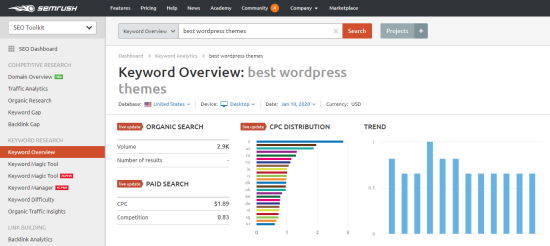
After scrolling down, you can also see a handy list of other similar keywords you might want to use, along with a list of organic search results, so you can find out where your competitors rank for the keyword. You can also check out Google Ads that use that keyword in PPC advertising (pay-per-click ads).

You can also type in any competitor’s website within the Domain Overview to ascertain their organic search terms, keyword data, and other organic traffic metrics.
If you click on the Organic Research tab, you’ll be ready to see relevant keywords, your competitor’s program ranking positions (SERPs), the traffic value (CPC), and more.

2. AnswerThePublic

AnswerThePublic works slightly differently from most other keyword research tools. They present keywords in a nice visual format although you’ll also see them during a list or download a .csv file of results.
If you’re just getting started with SEO and keyword research, then this is often an excellent tool to undertake, because you don’t even get to create an account to use it. Just type in your keyword and take a look at what comes up.

The keyword results from AnswerThePublic are supported by Google and Bing’s auto-suggest / auto-complete features. You can click on any of those keywords to look for it in Google, and it’ll open up during a new tab.
This will show what content is ranking for those terms and whether there’s a featured snippet thereon.
The free version of AnswerThePublic may be a great resource for bloggers. However, if you perform keyword searches on a daily basis, then you’ll need their pro plan.
3. Ubersuggest

Ubersuggestis a free tool from Neil Patel that offers search volume data, keyword suggestions, an idea of how difficult your keyword will be to rank for (keyword difficulty), and more.
As well as seeing lots of suggestions for related keywords, you can view a table of the top 100 Google results for that keyword, with estimated visits, number of backlinks, a domain score, and a total number of social shares.
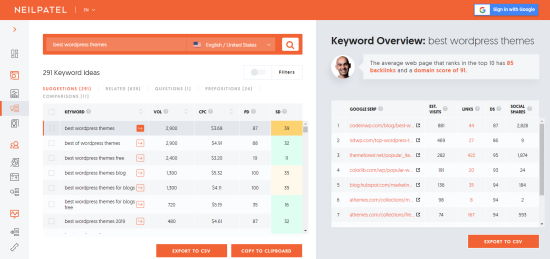
Under Content Ideas, it also shows content related to your keyword, listing estimated monthly visits, backlinks, and number of shares on Facebook and Pinterest.

If you sign into Ubersuggest with your Google account, then you’ll be able to get more keyword suggestions, daily rank tracking, and personalized SEO suggestions. UberSuggest also comes with a Chrome extension that can help you improve your workflow.
4. Ahrefs

Ahrefs is another popular keyword research tool that offers similar features to SEMrush. Using Ahrefs keyword explorer, you can come up with keyword ideas simply by typing a keyword into the search box. You’ll then see a whole list of keyword suggestions.
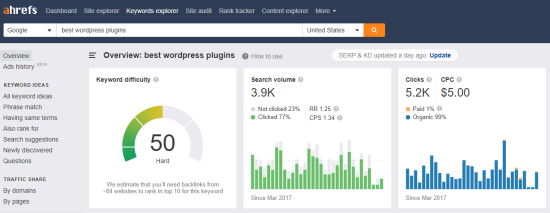
You can also use Ahrefs to see the keywords that your competitors are ranking for (but that you’re not), so you can create new content pieces targeting keywords related to those subjects.

Another nice competitive intelligence functionality that Ahrefs offer is the ability to see new keywords, and keyword movements in search queries.
Both SEMrush and Ahrefs offer a bunch of other useful tools too, like reports that find broken links on your site, PPC keywords for AdWords, and more.
5. Google Keyword Planner
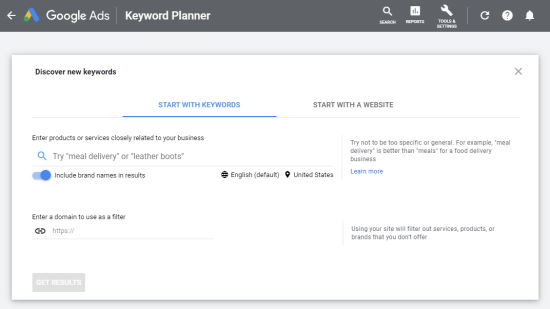
Google’s Keyword Planner is really designed for use by advertisers who want to run their ads on Google. However it’s still a useful tool for SEO, and unlike other paid tools, this is free to use.
To access it, you’ll need a Google Ads account. If you don’t already have one, then you’ll need to create one and enter your payment details, but you don’t need to run an active campaign or pay for anything.
Once you’ve got access to the Keyword Planner through your Google Ads account, you can type in any keyword and view data for (very approximately) how many monthly searches it has. You’ll also see a long list of related keyword ideas, which you scroll through or download.
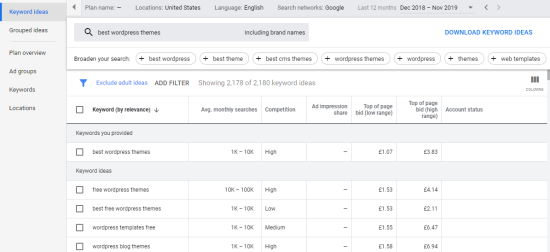
6. Long Tail Pro

Like most premium keyword tools, Long Tail Pro shows an overview of data about your keyword, with a particular focus on how you rank against your competitors on the first page of Google.
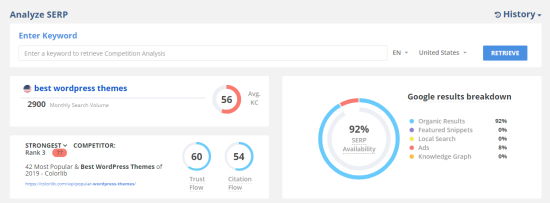
You can use it to take a look at the top results in search engines for your keyword, so you can figure out where you rank against your competition.
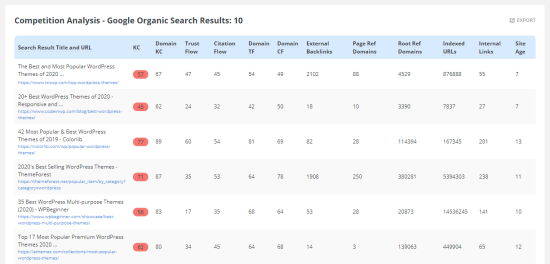
You can also enter specific keywords that you want to track, so you can see how your content is ranking for those keywords changes over time.
7. Serpstat

Serpstat is another excellent keyword research tool.
With Serpstat, you can easily view the top Google results for your keyword. These results include the site that appears in the featured snippet (if any) as the first result, which is why the post from IsItWP is featured in both first and second place in the screenshot below.
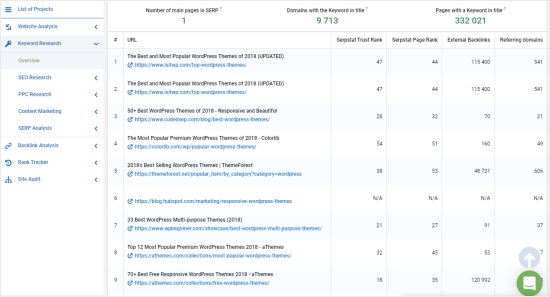
You can also view lots of details about your competitors for that keyword, with an indication of how visible they are (the higher the number here, the more visitors they likely receive).

8. SpyFu

SpyFu is designed to let you learn from your competitors by digging into their most profitable keywords (and their ads too).
You can try it out for free, without even logging in. Just type the URL of the site you want to check into the search bar and you’ll see the results straight away. If you want to take a look at more than one site, then you’ll need to create a free account and log in.
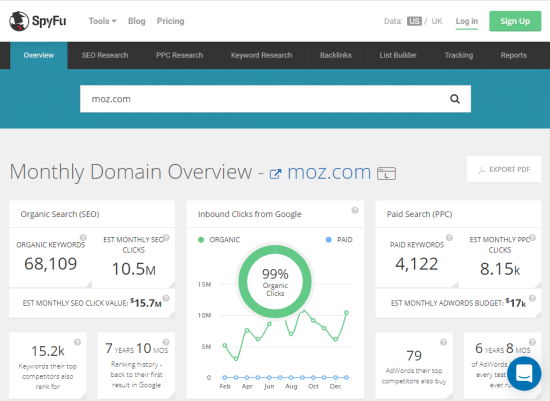
SpyFu collects past data, so you can see how your own site or your competitor’s site has fallen or risen in the rankings for particular keywords. You can also compare your site against other sites in your industry. Here’s a look at Moz’s website versus some other sites on similar topics.
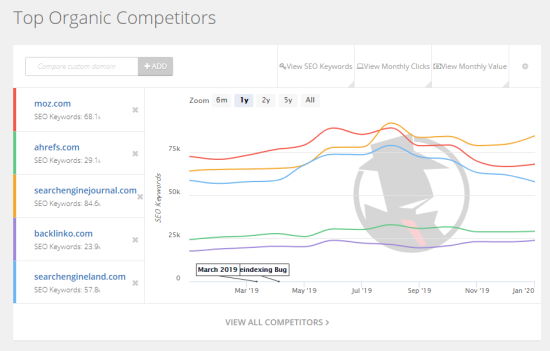
Which is the Best Keyword Research Tool? (Expert Pick)
After trying out all the popular keyword research tools, we believe that SEMRush is the best keyword research tool and the #1 SEO toolkit in the market.
If you’re looking for a free keyword research tool, then try out AnswerthePublic or Google Trends.
Whether you’re a blogger or eCommerce website, in order for keyword research strategy to work, you must set up Google Analytics and connect Google Search Console to your website.
These tools help you see how your website is performing for specific keywords along with showing you the average CTR (click-through rate) on your listing. You can tweak your title to boost CTR and further improve your keyword rankings.
We hope this article helped you find the best keyword research tools for SEO. You may also want to check out our guide on doing keyword research for tips on how best to carry out your research and put the results into practice.


